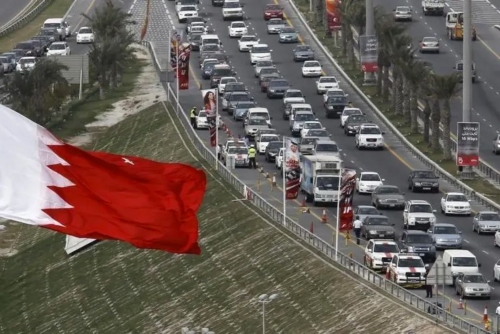Expat drivers under fire MPs debate Bahrain’s growing traffic congestion woes but remain divided over solutions
TDT | Manama
Email: mail@newsofbahrain.com
The Parliament debated Bahrain’s worsening traffic congestion yesterday, with some MPs blaming expat drivers for clogging roads while others called for urgent infrastructure upgrades and stricter planning. The session, chaired by Abdulnabi Salman, the First Deputy Speaker, saw a range of proposals addressing the long-term challenges of urban growth and daily gridlock.
The Speaker, Ahmed Al Musallam, stepped down to participate directly in the debate. MP Hassan Ebrahim warned of the economic toll caused by congestion.
Productivity
“The daily gridlock is eroding productivity in both public and private sectors while also harming Bahrain’s economy and tourism,” he said. He proposed measures including flexible working hours, remote working arrangements, road expansions, and improvements to public transport.
“We must act decisively to ease the congestion choking our roads,” he urged. MP Jalal Kadhem, however, drew attention to expat drivers, suggesting that their licences be linked to residency permits to prevent misuse of the roads.
Better oversight
“We need rules that work for everyone and ensure better oversight,” he said, adding that unregulated access to driving licences by expatriates contributes to congestion. He also called for a ban on the personal use of government vehicles outside work hours.
Hassan Bu Khammas pointed to the poor planning of roads in areas like northern Hidd and Qalali, describing Shaikh Khalifa bridge as a “bottleneck.” He criticised the unregulated use of vehicles for delivery services, which he argued worsens the issue.
Immediate remedies
“Our streets are clogged because of poorly managed traffic laws and a lack of control over heavy vehicles,” he said, calling for stricter enforcement and immediate remedies. MP Dr Hesham Al Ashiri demanded clarity from the Ministry of Works on the opening of Muharraq’s ring road, questioning delays despite visible progress.
“We see fences, lights, and a road that looks ready, yet there’s no official announcement. The Minister must give us a firm date,” he said, speculating the project might coincide with National Day celebrations. His Excellency Ebrahim Al Hawaj, Minister of Works, assured MPs of the government’s focus on maintaining high standards in infrastructure development, aligning with Vision 2030 and preparations for Vision 2050.
Continuous improvement
“The government prioritises continuous improvement of infrastructure to meet global standards, enhancing Bahrain’s investment appeal,” he said. He added that the Traffic Council, chaired by the Minister of Interior, coordinates with stakeholders to address mobility issues through traffic studies and consultancy work.
“These studies help prioritise and execute projects, whether it’s improving traffic signal systems, enhancing public transport, or managing road networks more effectively,” he explained. Al Hawaj also noted that “urgent solutions” packages are being implemented to resolve congestion hotspots while longerterm plans are developed.
Lack of foresight
MP Mohsen Al Asbool criticised the lack of foresight in infrastructure planning, citing East Sitra City as an example. “We’re opening massive housing developments without proper traffic solutions. This is short-sighted planning at its worst,” he said, pressing for strategies that span decades rather than quick fixes.
Mahmood Fardan called for solutions that address the root causes of congestion rather than shifting the problem from one area to another.
National issue
“Traffic congestion isn’t confined to a single governorate — it’s a national issue,” he said, calling for a coordinated and sustainable approach. MPs broadly agreed on the need for clear priorities, coordinated planning, and quicker execution of solutions.
Proposals included redistributing schools, creating dedicated lanes for buses and bicycles, and modernising public transport systems. “Effective planning and bold measures are what’s needed if we’re to free Bahrain’s roads from the grip of congestion,” Kadhem concluded.
Related Posts

